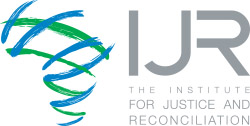The Institute gives an annual Reconciliation Award to an individual, community or organisation in South Africa that has contributed, in one way or another, towards reconciliation. Through this award the Institute would like to acknowledge and showcase the recipients’ approaches and strategies to enable reconciliation, whether they originate in the spheres of politics, media, business, culture, and academia or community service.
Previous recipients
In previous years, the following recipients have received the Reconciliation award:
2020/21: Bhekisisa Centre for Health Journalism for its role in reporting on the COVID pandemic
2019: Lalela life Changing Art and Early Birds Lifestyle Academy for their work in using arts to pursue social cohesion and community building.
2018: Mosilo Mothepu: For the courage displayed, in the fight against state capture, combatting corruption and advancing reconciliation”
2016 : Gender Dynamix: For their exceptional work in Advancing Transgender Human Rights in South Africa and their work in the Gender Justice Field
2015: Women on Farms Project (WFP) – ‘For: 20 years of shaping reconciliation by strengthening the capacity of women who live and work on farms.‘
2014: The Ruben Richards Foundation – ‘For enabling communities to overcome gangsterism and organised crime.’
2013: Symphonia for South Africa’s Partners for Possibility project – ‘For enlivening reconciliation by helping to bridge the social, economic and geographical divides between the business and education sectors.’
2012: The Socio-Economic Rights Institute – ‘For keeping the Marikana victims and their families on the national agenda.’
2011: Ms Olga Macingwane – ‘For her continued commitment to community reconciliation.’
2010: Insufficient applications
2009: Judge Albie Sachs – ‘For realising reconciliation through his life and work.’
2008: Shine Centre – ‘For helping, through volunteerism, foundation phase learners with literacy.’
2007: The community of Masiphumelele – ‘For setting an example in promoting tolerance towards foreign nationals, and in striving to ensure dignity and justice for all in their community.’
2006: Ouma Grietjie Adams -‘For holding the community together in mourning, conflict and celebration.’
2005: Brigalia Bam – ‘For her role in enabling peaceful democratic elections’
2004: Mary Burton – ‘For her work in the Black Sash and elsewhere’
2003: Dullah and Farieda Omar – ‘For their contribution to the TRC process’
2002: PJ Powers and Sibongile Khumalo – ‘For singing one another’s songs’
2001: Pieter Dirk Uys – ‘For enabling us to laugh at ourselves’
2000: Tim Modise – ‘For getting the nation talking’
Criteria for nominees
- The person/organisation nominations have to be based on the theme outlined in the call-out. The nominator needs to clearly state how the nominee links to the theme of the call-out.
- The achievements accomplished or work done needs to include the previous year. This means it can span over a longer period of time but has to include the previous year
- The achievements or work of the nominee has to be exceptional, and must have made a major contribution to reconciliation in the context where s/he is active. Exceptional means that it goes beyond the call of the person’s/organisation’s duty.
- The nominee should provide a living testimony to the values of democracy, inclusivity and non-violence, in public and private life.
- The nominee has to be based in South Africa and the reconciliation work has to relate to achievements in South Africa.
- The person or organisation cannot nominate him/her/themselves. No Board members or staff of the organisation can nominate its own organisation.
- The organisation/person shall not have received more than one award in the lifetime (for individuals post education achievements)
- A completed motivation and application form needs to be submitted by the closing date.







